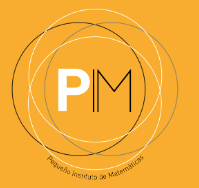Investigación
Noticias Destacadas
 Agenda del Departamento Agenda del Departamento |
- Información (provisional) sobre grupos y horarios de las asignaturas impartidas por el Departamento de Matemáticas, para el curso 2023-2024.
- Propuestas de Trabajos de Fin de Grado para el curso 2023-2024.
|
Canal @matematicasuamEnlace al canal del Departamento en youtube. |
PIM (Pequeño Instituto de Matemáticas)Con el objetivo de fomentar el interés por las matemáticas y dirigido a jóvenes entre 14 y 18 años, nace este proyecto de Instituto de Ciencias Matemáticas (ICMAT) en colaboración con nuestro Departamento, la Universidad Autónoma de Madrid y la Real Sociedad Matemática Española. El proyecto comienzó en el curso académico 2022-2023. Ampliar información en su página web. |
Machine learning in Madrid
Machine learning in Madrid
Lunes, 24 de mayo de 2021, 12-13h
Ponente: Marcelo Bertalmío (IO-CSIC)
Título: Evidence for the intrinsically nonlinear nature of receptive fields in vision
Abstract: The responses of visual neurons, as well as visual perception phenomena in general, are highly nonlinear functions of the visual input, while most vision models are grounded on the notion of a linear receptive field (RF). The linear RF has a number of inherent problems: it changes with the input, it presupposes a set of basis functions for the visual system, and it conflicts with recent studies on dendritic computations. Here we propose to model the RF in a nonlinear manner, introducing the intrinsically nonlinear receptive field (INRF). Apart from being more physiologically plausible and embodying the efficient representation principle, the INRF has a key property of wide-ranging implications: for several vision science phenomena where a linear RF must vary with the input in order to predict responses, the INRF can remain constant under different stimuli. We also prove that Artificial Neural Networks with INRF modules instead of linear filters have a remarkably improved performance and better emulate basic human perception.
Localización Lunes, 24 de mayo de 2021, 12-13h






